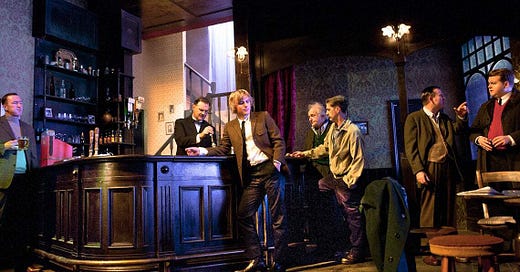The first scene of Martin McDonagh’s Hangmen is exactly what you would want from one of his plays. Darkly funny, tense, and violent—and all the more disturbing because what we’re witnessing is the legal execution of a man who begs for his life as he proclaims his innocence as his executioners carry on with his murder as though it were just another day at the office.
McDonagh’s play begins a few years before hanging was abolished in the U.K. After the prologue, there’s a time-jump that takes us to a gorgeously designed pub in Oldham in 1965. Anna Fleischle did an incredible job with the three locations of the play as well as the top-notch costume design. The pub belongs to Harry Wade, the UK’s second-best hangman, who runs the establishment with his wife, Alice, and his daughter, Shirley. On the day hanging is to be abolished, Harry’s pub is filled with people wanting to know his opinion on his chosen profession being outlawed.
This is a fantastic set-up for a play that sadly only scratches the surface of its own potential. McDonagh is, in some ways, a classical kind of playwright. He enjoys watching his characters spin their wheels before he inserts a theatrical drop that turns the plot on its head. Here, there’s the promise of something a bit deeper. A playwright known for creating unforgettable onstage violence looks at the death penalty? Sign me up.
What we get instead is a by-the-book McDonagh that occasionally feels more like a Conor McPherson. There’s a bevy of barflies, who prod and poke at Harry as he yells them all off, insisting on keeping his thoughts to himself. That is, until a reporter wants to do an interview with him. That makes up a bulk of the story until Shirley is seduced by an eerie young man named Mooney whose motives remain questionable right up until Shirley goes missing and Mooney seems to be the likely suspect.
Act Two opens with an admission from Mooney to his accomplice, a scorned colleague of Harry’s, that he did kidnap Shirley and he’s holding her in a garage somewhere. Mooney then decides to show up at Harry’s bar and strut around playing innocent. Harry doesn’t buy it, and he proceeds to hang Mooney right there in the pub, trying to get information out of him. When Pierrepoint, the #1 Hangman in the country and Harry’s nemesis, shows up unexpectedly to harangue Harry for what he said in his interview, a series of mishaps leads to Mooney being hung behind a curtain only to have Shirley show up unharmed.
The Pierrepoint scene is the best in the play, and the resulting image of a group of men standing around Mooney’s dead body is certainly indelible. The issue is—
How did we get here?
It’s never clear why Mooney would have lied to his accomplice about kidnapping Shirley. We know that Mooney seems to want Harry to hang on to make some kind of point, but when we’re led to believe Mooney might have a connection to the executed man in the first scene, we find out that Mooney may have been the actual culprit in that crime. So…is he upset that the wrong man was executed even though he obviously didn’t feel bad enough about it to come forward and save the man? Regarding Mooney, a lot is left up in the air, but perhaps even more is left vague regarding Harry.
McDonagh characters are not known for their arcs. The playwright is a prime example of theatrical convention being challenged successfully. Something about his characters’ refusals to learn or grow almost seems to work in their favor and to the benefit of the play. McDonagh’s “People not only don’t change, they’re actually worse than you think” philosophy mixed with his ability to make an audience laugh at its own gullibility has always been his greatest skill as a playwight. And yet here, either there isn’t enough sugar to take down the medicine, or we’re simply living in a time when watching people be awful to each other for seemingly no reason just doesn’t hit the way it used to.
Hangmen is new to Broadway, but the play itself is nearly seven years old. While I don’t find the show to be dated, it also isn’t an elevated version of what we know McDonagh can deliver in his sleep. It’s certainly worth seeing for the stellar acting and polished production, but once the handful of shocks wear off, you’re not likely to remember much of what you saw.
Lately, it takes a special kind of shock to make a lasting impact.



